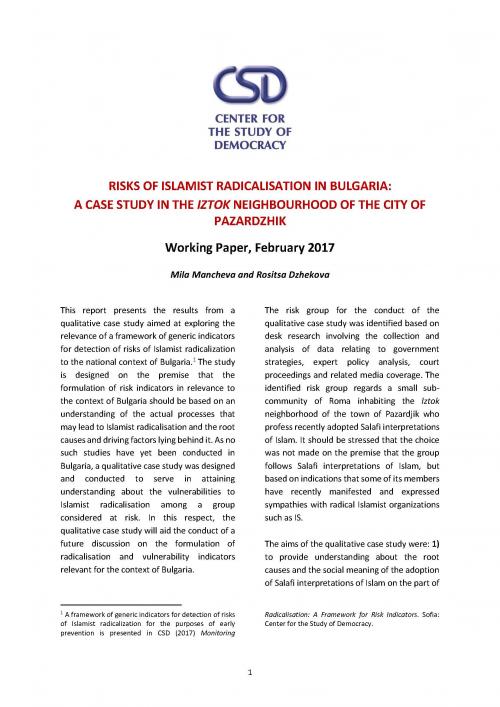Risks of Islamist Radicalisation in Bulgaria: A Case Study in the Iztok Neighbourhood of the City of Pazardzhik
Risks of Islamist Radicalisation in Bulgaria: A Case Study in the Iztok Neighbourhood of the City of Pazardzhik
Author(s): Mila Mancheva, Rositsa Dzhekova
Subject(s): Politics / Political Sciences, Politics, Social Sciences, Sociology, Security and defense, Applied Sociology, Evaluation research, Social development, Studies in violence and power, Nationalism Studies, Migration Studies, Inter-Ethnic Relations, Ethnic Minorities Studies, Sociology of Politics, Globalization
Published by: Център за изследване на демокрацията
Summary/Abstract: In the context of the escalation of extremist Islamist violence in many EC countries today, the issue of the risks of home grown Islamist radicalization in Bulgaria is the subject of heated public debates. Preventing and studying (Islamist) radicalization has become a priority in Europe, giving rise to wealth of publications that explore its motives and causes as well as the processes whereby individuals and groups come to espouse extremist ideas and engage in violent actions. Such studies are lacking in Bulgaria while worries about the potential influence that international terrorist organisations and the related Islamist extremist ideologies could exert in the country are rising. This working paper presents the results from a qualitative study aiming to attain understanding about the vulnerabilities to Islamist radicalisation among a group of inhabitants of the “Iztok” neighborhood of the city of Pazardjik who are considered at risk. The study explores the root causes and the social meaning of the adoption of Salafi interpretations of Islam on the part of sub group local Roma and the root causes and the social meaning of certain manifestations of sympathy with radical Islamist ideas and organisations among some members of the group. Careful attention is paid to the factors and channels through which the two processes are fostered. A discussion is provided to the issue of the vulnerabilities to potential radicalisation among members of the group of Roma professing Salafi interpretation of Islam.
Series: CSD Social Studies Papers
- Page Count: 30
- Publication Year: 2017
- Language: English
- Content File-PDF

